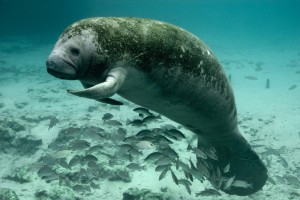
This 19 fact sheet curriculum series provides a series of individual lessons covering manatee biology and ecology, as well as highlighting some of the ways that humans impact and can protect manatees. The curriculum has been written at a third grade level but can be adapted for older or younger students. (Photo credit: Keith Ramos, USFWS)
http://edis.ifas.ufl.edu/topic_series_third_grade_manatee_workbook
Tag: Curricula
Investigating the Fungus Among Us: A 4-H Educational Curriculum on Mold (4HHLL70/4H311)
This unit investigates both the benefits and the dangers of mold or mold-based products. By completing the activities in each of the five lessons, youth (grades 5-8) will examine the positive and negative attributes of mold, the conditions that promote mold growth, and how growth can cause illness. They will also learn methods used to deal with mold growth in the home. This 58-page curriculum was written by Jessica Kochert and Joy Jordan, and published by the UF Department of 4-H Youth Development, March 2011.
http://edis.ifas.ufl.edu/4h311
ENY-1000/IN758 Insects, Oh Yes!
ENY-1000, a 10-page illustrated fact sheet by S. McCann, J. D. Ellis, and M. K. O’Malley, is a general overview of insects, their importance, and their biology. It is designed as a supplemental elementary school curriculum for Grades 1-3, although it can apply to older or younger children as well. Published by the UF Department of Entomology and Nematology, December 2008.
http://edis.ifas.ufl.edu/IN758
ENY-1001/IN759 Guide to Collecting and Maintaining Live Arthropods for Classroom Display in Florida
ENY-1001, a 6-page illustrated fact sheet by S. McCann, J. D. Ellis, and M. K. O’Malley, details the process of maintaining live insect displays for educational purposes in Florida. Includes references. Published by the UF Department of Entomology and Nematology, January 2008.
http://edis.ifas.ufl.edu/IN759
FOR 172/FR231 Urban Forest Educational Resources for Teaching Youth
FOR-172, a 5-page fact sheet by Jennifer Seitz, Martha Monroe and Francisco Escobedo, lists and describes resources available to assist educators, extension agents, home school parents, foresters, and nature center staff as they help youth become more aware of the urban forests in their backyard. Published by the UF School of Forest Resources and Conservation, January 2008.
http://edis.ifas.ufl.edu/FR231